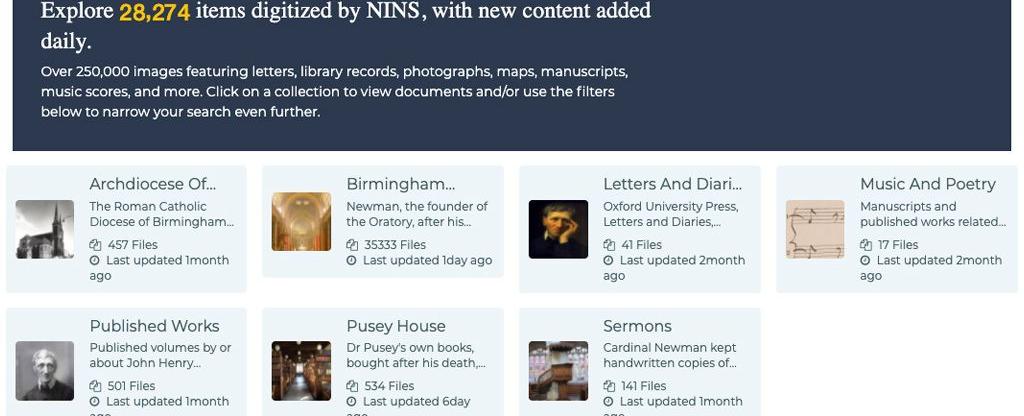NINS's Expanding Collections

The National Institute for Newman Studies (NINS) is pleased to announce the ongoing expansion of our digital collections through formal agreements with several institutions in England. While the NINS Digital Collections currently holds more than 28,000 documents, these collaborative efforts will eventually double this number, as well as open up new possibilities for our users and Newman scholarship more broadly speaking. In the course of the past year, and stemming from conversations that began prior to my tenure as Director, NINS has entered into agreements to digitize additional collections from the following institutions and collaborators: the Archdiocese of Birmingham, Pusey House (Oxford), the Birmingham Oratory, and the Diocese of Westminster.
The Birmingham Archdiocesan Archives
In mid-2021, NINS entered into an agreement with the Birmingham Archdiocesan Archives to digitize 457 Newman or Newman-related letters (1,158 images in total). The Birmingham Diocese is where Newman and his followers found a home after leaving Oxford in the 1840s, through the friendship of Bishop W. B. Ullathorne (1806–1889). These letters have already been uploaded to our web platform and are available here.
Pusey House Library & Archive (Oxford)
Also in mid-2021, NINS entered into an agreement with Pusey House to digitize 534 Newman and Newman-related letters (979 images in total). Edward Bouverie Pusey (1800–1882) was a leading figure in the Oxford Movement, fellow of Oriel College, and close associate of Newman in the attempts to reinvigorate the Church of England in the 1830s and 1840s amid great volatility. This collection is also available to our users and can be found here. NINS and Pusey House might still collaborate on the digitization of further material as it is found.
The Birmingham Oratory (Second Phase)
When NINS was founded, there was a goal to make Newman’s published works available online, and soon that goal expanded to include Newman’s unpublished letters and other pertinent texts and documents. This meant an ongoing campaign to locate, scan, upload, and make available these documents to the broader public. To this point, the vast majority of documents has come from the Birmingham Oratory, which Newman founded and was the place where he spent most of his life as a Catholic. In recent years, it was discovered that a substantial number of documents (approximately 4,500) in the House Archives Room were in need of digitization, and we are grateful to our colleagues at the Birmingham Oratory for the willingness to enter into an agreement to carry out this important work. Many of these documents involve other founding Fathers of the English Oratory who lived with Cardinal Newman: Father William Neville Paine, Father Edward Caswall, Father Nicholas Darnell, Father Paul Eaglesim, Father William Palmer, Father William Penny, and Father Frederick Bowles. This collection is currently in progress, and images are already available to our users as part of the existing collection; click here to access it.
The Roman Catholic Diocese of Westminster Archives
The Cardinal Archbishop of Westminster is recognized as the head of the Catholic Church in England and Wales. Three nineteenth-century Cardinals—Nicholas Wiseman (1802–1865), Henry Edward Manning (1808–1892), and Herbert Vaughan (1832–1903)—played a pivotal role in Newman’s life and are important for understanding the development of the Oxford Movement and the Catholic Church in England. In this vein, NINS and its digitization partner, Icam Archive Systems, Ltd., will soon begin collecting and digitizing RCDW’s materials from the collections of Cardinals Wiseman, Manning, and Vaughan (around 24,000 items).
NINS will continue to pursue collections of Newman and Newman-related content, thanks in large part to the generosity and vision of its Board of Trustees. If you would like to contact NINS to discuss the digitization of such material—that you have, or your organization has—please email the Director at ccimorelli@ninsdu.org.
Christopher Cimorelli
Director of the National Institute for Newman Studies
Christopher Cimorelli is the Director of the National Institute for Newman Studies and Associate Editor of the Newman Studies Journal. He is the author of the monograph, John Henry Newman’s Theology of History: Historical Consciousness, ‘Theological Imaginaries’, and the Development of Tradition (Peeters, 2017) and the co-editor of Salvation in the World: The Crossroads of Public Theology (Bloomsbury, 2017). He has varied research interests, including Newman studies, doctrinal development, views of doctrine and the magisterium, apophatic theology, spirituality, and ecotheology.
QUICK LINKS

